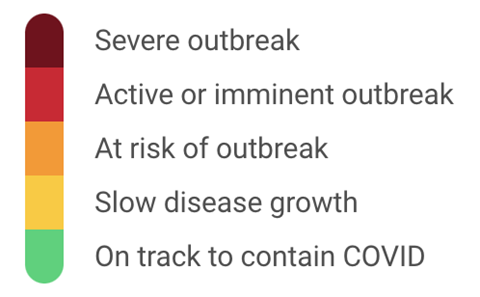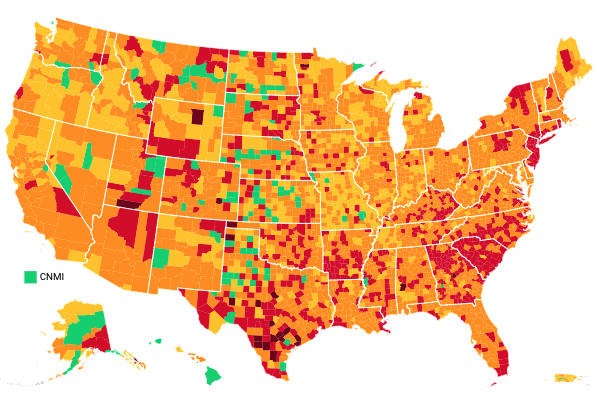Covid Act Now Daily Download
21:00 ET 02 March 2021
U.S. COVID Map & Risk Levels
Risk Levels*

U.S. Vitals
Cases: 28,453,529
+54,248 /24h
Deaths: 506,373
+1,885 /24h
Tests: 357,068,278
+1,349,529 /24h
Data derived from The Covid Tracking Project
The Day’s Top COVID Stories
STAT News covers the Biden administration's new announcement that the U.S. will have enough vaccines for all adults by the end of May. Previously, the administration pledged to have enough vaccines to inoculate roughly 300 million adults by the end of July. The increase in expected supply is driven by a new agreement between the administration and Merck, a pharmaceutical company that halted research on its own COVID vaccine earlier this year. To help speed up rollout, Merck will help manufacture the recently approved Johnson & Johnson vaccine. While the accelerating timeline is exciting, it does not necessarily mean that all adults will be vaccinated by the end of May. The U.S. still must overcome distribution challenges, like the need for vaccinators, before the shots can all go into arms.
The New York Times explores how the P.1 variant (first identified in Brazil) is driving reinfections. A record-breaking recent case surge in Manaus, a Brazilian city that some experts believe had reached herd immunity last spring, led researchers to investigate whether the new variant could evade previous immunity. In Manaus, researchers found that up to 61 percent of people who previously had COVID could be reinfected with P.1. The variant shares some mutations with B.1.1.7 (first identified in U.K.) and B.1.351 (first identified in South Africa) that allow it to spread more easily, as well as additional mutations that help it escape antibodies. Researchers also found that CoronaVac, a Chinese vaccine currently being distributed in Brazil, is less effective against P.1. than other variants.
- USA Today dives into a new nationwide initiative to study COVID long-haulers. Dr. Fauci announced the initiative last week, along with a new name for long COVID, Post Acute Sequelae of SARS-CoV-2 (PASC). The initiative seeks to answer questions about why some patients, known as long-haulers, continue to experience persistent symptoms months after recovering from COVID infections. While symptoms vary, the most commonly reported is “brain fog,” which includes memory problems, difficulty focusing, and intense fatigue. The launch of the initiative follows a recent study finding that 30 percent of all COVID patients still reported residual symptoms up to nine months after their illness.
New COVID Literature & Studies
A study mathematically analyzes the effectiveness of various interventions aimed at limiting COVID transmission in retail stores. These interventions include reductions in customer density and restricting movement of customers in stores to one-way flow. The researchers assess two mechanisms of transmission: 1) close contact and 2) wake exposure, which refers to spread of viruses from one person by airflow to someone behind. Restricting customer movement to one-way flow is only effective if COVID spreads by close contact, while reducing customer density is very effective with either mechanism. Read the study.
- A pre-peer reviewed study offers preliminary results showing that one dose of the Pfizer COVID vaccine can reduce the risk of COVID by 75%, 12 days after vaccination. One dose of the vaccine was also able to reduce even asymptomatic infection by the same amount. The full data of this study has not been released yet. Read the study.


No comments:
Post a Comment